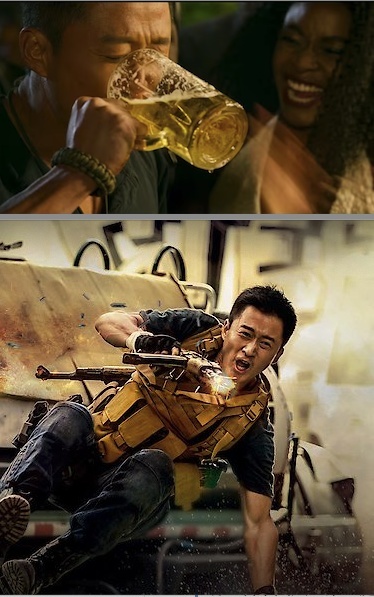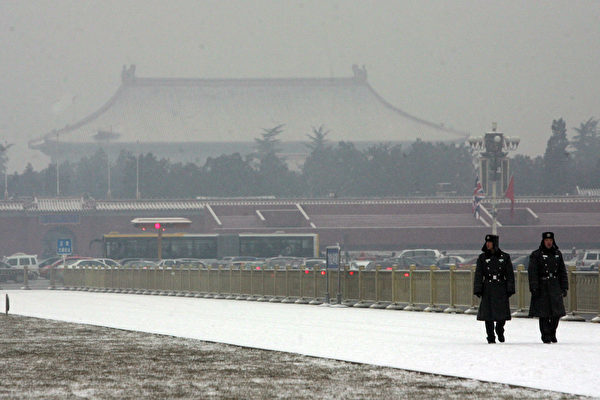File photo: On March 5, 2021, the day before the opening of China‘s National People‘s Congress (NPC), police patrol Tiananmen Square with dogs on a day of heavy air pollution in Beijing. (Photo by Kevin Frayer/Getty Images.)
[People News] Recently, Chinese political scientist Wu Guoguang, Senior Research Scholar at Stanford University’s Centre on China’s Economy and Institutions, appeared on Taiwan CTS’s talk show Three Kingdoms Forum, hosted by international political economist Wang Hao with veteran Japanese journalist Akio Yaita as guest commentator. Wu discussed how China might undergo transformation in the post-Xi Jinping era.
He envisioned the best-case scenario: that a mass uprising (“popular revolt”) triggers internal splits within the CCP regime, leading to a soft landing — a transition beyond Communist Party rule.
Wu analysed that if Xi Jinping were to die, or be removed from power, and popular uprisings immediately broke out, that moment could open the best window of opportunity to push China into a post-CCP future.
The key, he said, is to induce division within the Party-state itself: “When enough people inside the system see the power of public opinion, they will defect to your side. Whether they are opportunists or ambitious climbers doesn’t matter. As long as they stand with the people, then regime transformation through a soft landing becomes possible.”
Wu emphasised that a hard-landing revolution is not only too costly, but also highly unlikely. The CCP controls the state machinery and enormous wealth; for grassroots forces to confront it head-on would be doomed to failure.
He recalled that even during the 1989 Tiananmen movement, there had been a window for soft-landing transition — but the opportunity was crushed by military suppression.
In spring 1989, students gathered at Tiananmen Square to mourn former CCP General Secretary Hu Yaobang. The event quickly escalated into a nationwide movement against corruption and for democracy and freedom. CCP paramount leader Deng Xiaoping ordered the army to suppress it. Premier Li Peng had already declared martial law in parts of Beijing.
Wu noted that at the time, many within the system called for an emergency session of the National People’s Congress (NPC) Standing Committee, urging NPC Chairman Wan Li — then on an overseas visit — to return and preside.
On May 21, 1989, former People’s Daily editor-in-chief Hu Jiwei and 23 other NPC Standing Committee members wrote a joint petition: “The situation in Beijing and across the country shows our nation has entered an extremely grave crisis. As members of the highest state power organ chosen by the people, we must be fully responsible to the People’s Republic. At this critical juncture, the NPC Standing Committee must immediately act through legal procedure to reflect the people’s will.”
They proposed an emergency NPC Standing Committee meeting around May 24–26 to address the crisis and seek lawful solutions. If that could not be convened, they suggested at least holding an informal emergency meeting of members in Beijing.
Hu Jiwei asked sociologist Cao Siyuan and others to collect signatures in Beijing. A total of 57 members eventually signed.
Wu Guoguang argued that if the NPC Standing Committee had met then and declared Li Peng’s martial law decree illegal, China could have achieved a soft-landing transformation — a decisive step toward democratisation.
He added: “Deng Xiaoping mobilised so many troops into Beijing not just against the students, but more to guard against splits inside the Party system itself — from the NPC Standing Committee, from General Secretary Zhao Ziyang, from NPC Chairman Wan Li, to the many cadres of central ministries who marched in protest.”
Wu speculated: if Xi Jinping were to die tomorrow and ordinary people celebrated in the streets with fireworks and drinking, the new CCP leadership would face a choice — suppress or not suppress?
“If they suppress, no one will believe they are reformers. Both international and domestic forces will push further for political change. We must not be deceived again — we must drive political transformation forward.”
Wu stressed, however, that if Chinese citizens, dissidents, and rights advocates do not take action, do not seize the chance to pry open the system, then even with such a window of opportunity, a soft-landing transition will not occur.
He underscored that the scenario he outlines is inherently dynamic, shaped by social interaction: “Everything we do and say may influence the outcome. The interaction between grassroots society and official power is the true key to China’s future.”
Other scholars have also explored post-Xi scenarios. French sinologist Jean-Pierre Cabestan (Bai Xia), who has observed China’s development since the 1970s, told Voice of America that after Xi, the CCP is likely to revert to a system of collective leadership and engage in self-criticism over Xi Jinping’s mistakes.
(People News original publication) △











News magazine bootstrap themes!
I like this themes, fast loading and look profesional
Thank you Carlos!
You're welcome!
Please support me with give positive rating!
Yes Sure!